Spotlight on CCEO international work: UN workshop on water quality and Indigenous knowledge, GEO Ministerial Summit, and CEOS Plenary
CSIRO’s Centre for Earth observation (CCEO) has continued to strengthen and diversify its engagement with international partners over the last few months. This includes participation in international conferences and formal representation at major meetings such as the ESA FRINGE 2023, the World Business Satellite Week where SAR Capabilities were discussed, or the Asia-Pacific Regional Space Agency Forum (APRSAF) noting that 2024 meeting will be held in Perth. In addition, CSIRO successfully developed a proposal with GEO AquaWatch in a UN Challenge (see below), others represented CSIRO at major international EO community meetings (GEO Ministerial Summit and CEOS Plenary) to share updates, contribute to global efforts in key activities, and discuss bilateral opportunities.
UN Challenge on Water quality workshop (the Netherlands)
Indigenous peoples are at the forefront of current global challenges impacts including accessing safe water (see article). In this context, CSIRO, through its Mission AquaWatch Australia teamed up with the Group on Earth Observation (GEO) AquaWatch (a global community of practice on water quality) and GEO Indigenous alliance, developed a successful proposal to lead a discussion on Indigenous water quality issues at a UN Global Challenge meeting in Petten, in September 2023. One of the objectives was to start building a network of Indigenous water quality specialists from across the globe, connecting Australia’s Indigenous water experts to those on other continents. A paper describing the key findings and outcomes of the workshop, is being written to address various perspectives and issues, such as how to incorporate Indigenous knowledge (including science and data) into western science programs, and an opportunity for western science to support Indigenous ways of life.
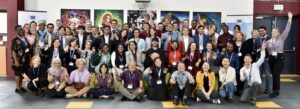
UN Challenge workshop including MAGIK participants – Netherlands, September 2023
GEO Week (Plenary and Ministerial Summit), South Africa
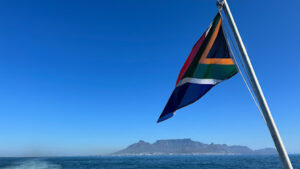
The Group on Earth Observation (GEO) community gathered early November in Cape Town to network, showcase successful GEO activities, advance EO opportunities, discuss challenges and adopt new plans for the post-2025 period.
CSIRO, through its Centre for EO involved in a range of GEO activities, joined the Australian delegation (led by Geoscience Australia, GA) and represented the organisation at the main proceedings and special events/opportunities.
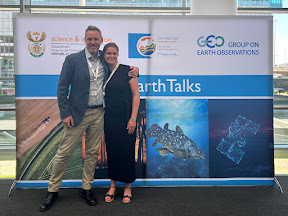
CSIRO delegation at GEO Week, Cape Town 2023 – Dr Neil Sims and Flora Kerblat (Centre for Earth Observation)
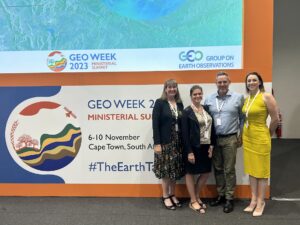
Part of the Australian delegation (Geoscience Australia and CSIRO) at the GEO week 2023
Some of CSIRO’s highlights or key takeaways:
- GEO is a fundamental global forum for all Earth observation experts willing to share, connect with others, and broaden their horizon
- CEOS, as Participating Organization, plays a key role in many events during the GEO Week: CSIRO also joined the CEOS delegation and exhibition booth and supported the SEO team in promoting CEOS activities (including distribution of SDG flyers, etc.)
- GEO Land Degradation Neutrality (GEO LDN), co-led by CSIRO with other colleagues from Ghana, Germany, is still growing and seen as one of the more successful and dynamic initiatives:
- GEO LDN Global Dialogue Forum was held 3 days, just before the GEO Week (applications from 59 teams across 40 countries, and 15 countries were hosted for the event)
- Indigenous engagement strongly supported in particular through water quality projects:
- Showcase (called ‘Melding AquaWatch & Global Indigenous Knowledge’, MAGIK) was given on water quality and Indigenous engagement, presenting outcomes of the UN Challenge workshop held in the Netherlands
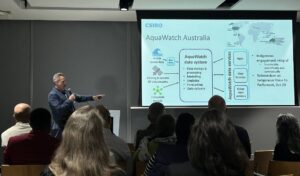
AquaWatch Australia presented (Dr Neil Sims and Janet Anstee) at the MAGIK session - GEO week, 2023
CSIRO’s AquaWatch Australia presented at the MAGIK session – GEO week, 2023
- Showcase (called ‘Melding AquaWatch & Global Indigenous Knowledge’, MAGIK) was given on water quality and Indigenous engagement, presenting outcomes of the UN Challenge workshop held in the Netherlands
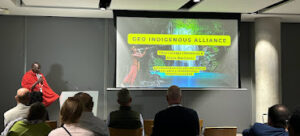
GEO Indigenous Alliance at the MAGIK session, GEO Week 2023
-
- AquaWatch Australia and water quality: new connections and potential opportunities with GEO Blue Planet (interested in working more on coastal project and in the Pacific), Global Water Sustainability Initiative GEOGLOWS (which was awarded US $2 million from NOAA to help provide support and early warning services for critical water resources in Africa) and other relevant activities.
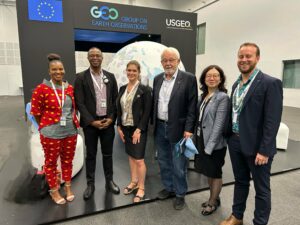
GEO Pacific Islands Advisory Group members at the GEO Week, Cape Town, 2023
- Strengthened our engagement with the Pacific: for the first time, we met with other members (incl. from France/New Caledonia, UNSW/Australia, China, SPC) of the GEO Pacific Islands Advisory Group (PIAG), a group co-led by Australia (CSIRO/GA) and established in 2020 following the Canberra Declaration (GEO Ministerial in 2029, Canberra); discussions around its current and planned activities (e.g. refinement of their satellite data requirements in close collaboration with SPC and SPREP, two main regional bodies, and international satellite data providers through CEOS); and about future role and form of PIAG (linkages with other Small Islands Developing States (SIDS))
- ‘Earth Intelligence for All’: the newly adopted post 2025 Strategy reaffirms GEO’s commitment to be more inclusive and sustainable, aligned with global Agendas that GEO already supports, such as Climate Conventions, Sendai Disasters Framework, and the UNSDGs (United Nations Sustainable Development Goals):
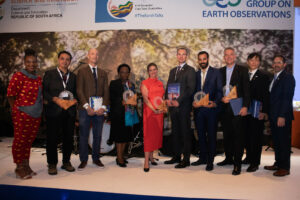
GEO 2023 SDG Award Winners – including CSIRO and NASA receiving the CEOS Coordination Group one (Participating Organisation)
- CSIRO and NASA, on behalf of the team, accepted one of the 2023 Group on Earth Observations Sustainable Development Goals Award during the GEO Week & Ministerial Summit, held in Cape Town (South Africa), in November 2023. The Award recognizes CSIRO’s foundational and leading role in the CEOS Coordination Group in support of the United Nations Sustainable Development Goals, UNSDGs. With colleagues from the International Committee on Earth Observation Satellites (CEOS), we delivered significant contributions in support of the 2030 Agenda and our achievements were complimented this year. More here about the GEO SDG Award (GEO Participating Organisation category).
- CSIRO also participated in the SDG workshop highlighting other related projects and discussed future opportunities, including how GEO can leverage its current engagement and activities to ensure EO is considered ‘traditional’ data for whatever policy framework comes after 2030).
- CSIRO and NASA, on behalf of the team, accepted one of the 2023 Group on Earth Observations Sustainable Development Goals Award during the GEO Week & Ministerial Summit, held in Cape Town (South Africa), in November 2023. The Award recognizes CSIRO’s foundational and leading role in the CEOS Coordination Group in support of the United Nations Sustainable Development Goals, UNSDGs. With colleagues from the International Committee on Earth Observation Satellites (CEOS), we delivered significant contributions in support of the 2030 Agenda and our achievements were complimented this year. More here about the GEO SDG Award (GEO Participating Organisation category).
- the International Institute for Sustainable Development (IISD) network wrote a nice summary of the week (including the adoption of the Youth Declaration, the post-2025 Strategy, and the 3-page Ministerial Declaration, as well as the launch of the new GEO website).
Plenary meeting (Thailand) wrapping up a busy year in CEOS
A few CCEO members represented CSIRO in Thailand, to participate in the 37TH CEOS Plenary, hosted by the Thai Geo-Informatics and Space Technology Development Agency (GISTDA) in Chiang Rai, the following week.
Ahead of this annual meeting, the CEOS working teams gathered a few weeks earlier in Frascati, Italy (SIT Technical Workshop hosted by ESA), to prepare and discuss technical challenges before presenting to CEOS Principals. Other working groups held annual meetings, such as WGISS (Information and Systems Services), of which CCEO is an active member to promote the development of CSIRO’stechnology (such as CSIRO’s Award finalist EASI team) while improving data systems and services to the EO global community. Our CSIRO calibration and validation experts also participated in global activities (SRIX4VEG, RadCalNet proposal for the Pinnacle site), and key meetings such as the WGCV IVOS meeting (Germany) and VH-RODA (Italy).

CEOS-ARD self-assessment of 14 NovaSAR products
This year, the CSIRO SAR team submitted a successful CEOS-ARD self-assessment for 14 NovaSAR Normalised Radar Backscatter (NRB) products which all have been evaluated as CEOS-ARD compliant at the Threshold level. Another fantastic CSIRO’s contribution to CEOS work made possible through our involvement with international work.
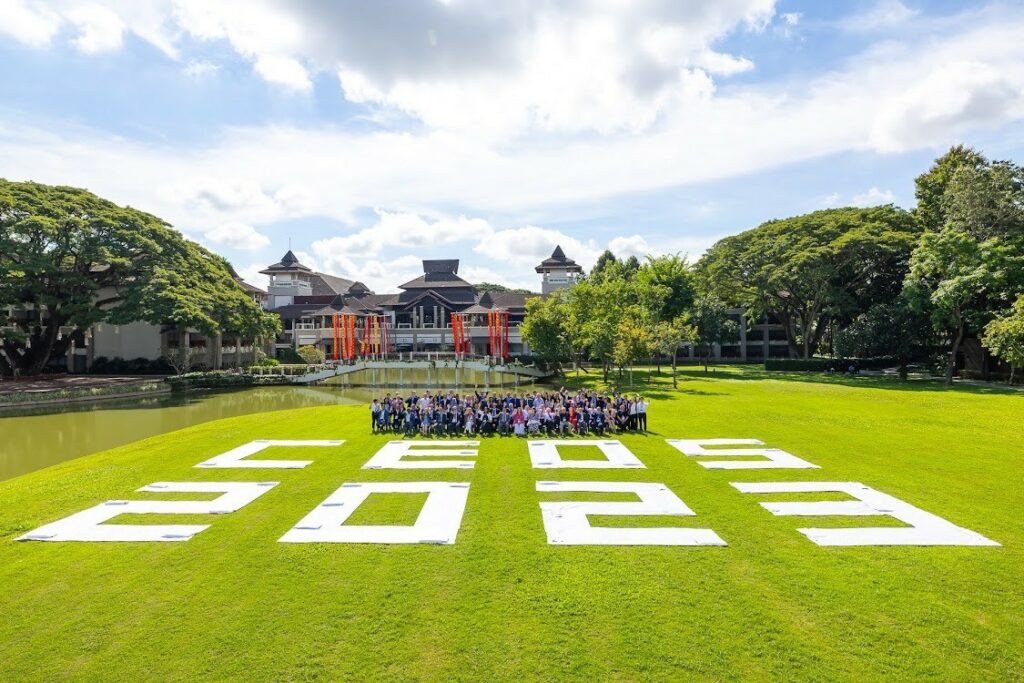
37th CEOS Plenary attendees in Chiang Rai, Thailand (picture taken by a drone )
37th CEOS Plenary in Chiang Rai, 2023 – group photo taken by a drone
These few days allowed the delegation to:
- Hold bilateral meetings with other Space Agencies, discussed priorities and potential joint opportunities including Earth Observation high-level agreements, water quality/AquaWatch Australia, calibration/validation, data analytics, and themes like Biodiversity and UNSDGs;
- Participated in the Carbon accounting from Space workshop (in a context of growing needs for transparent and accurate data to help track and measure greenhouse gas emissions and climate change impacts);
- Organised and delivered side-meetings (Ecosystem Extent Task Team; SDG Coordination Group)
- Represented CSIRO (and team Australia, alongside our colleague from Geoscience Australia (GA)) during the 2-day Plenary: as per the Agenda, we learned about other Agencies’ recent developments, endorsed new documents and ideas, discussed CEOS strategic priorities (incl. engagement with New Space, Climate and Greenhouse Gas emissions related products, Biodiversity, Data analytics and interoperability, Calibration/Validation, etc.)
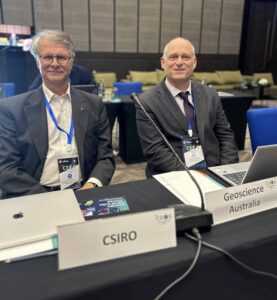
CSIRO and Geoscience Australia’s CEOS Principals
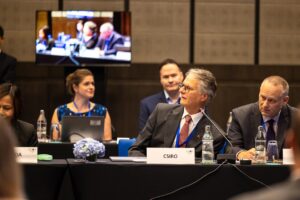
CSIRO’s CEOS Principal (Dr Alex Held) making an intervention at the CEOS Plenary, 2023
- Joined the first-ever attempted ‘CEOS Group photo taken from Space’, since Thailand had just successfully launched the THEOS-2 satellite (Thailand Earth Observation System-2 with main applications as vegetation, albedo and reflectance, landscape topography, multi-purpose imagery (land)), the Thai GISTDA organised the group photo at the time of the satellite pass.
These face-to-face connections are always a fantastic opportunity to reconnect with known faces, and more importantly meet new people and explore new opportunities that can help CSIRO and Australia meet their own priorities, aligned with international agendas and supporting national capacity building.
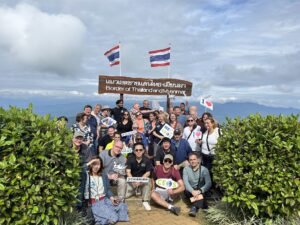
The CCEO will endeavor to turn these interactions and discussions into implementation and further actions, by reaching out internally to experts. We look forward to continuing teamwork with domestic and international partners to increase Australia’s EO capability and contributions to global impacts.
